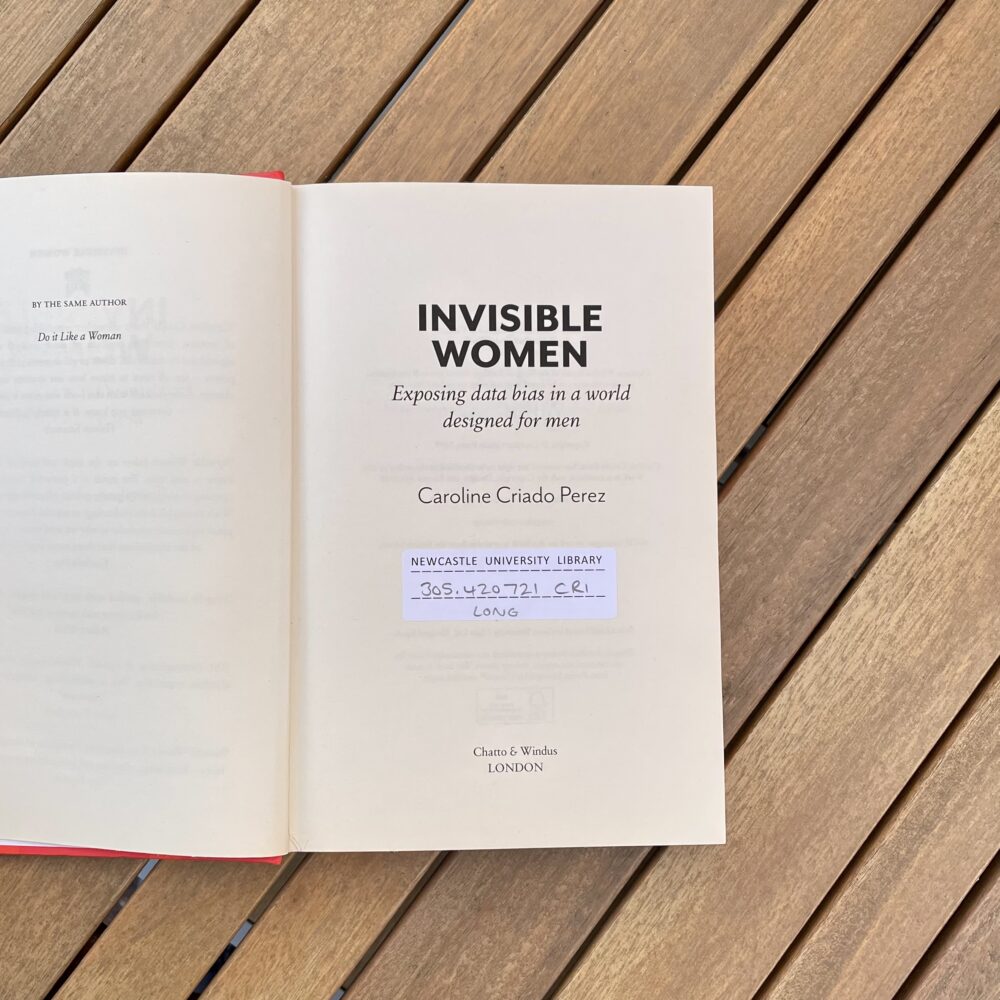I’ve been reading ‘Invisible Women’ by Caroline Criado Perez

This 2019 bestseller is tricky for me to write about because I have strong feelings in two completely contrary directions.
This book is excellent at highlighting hidden injustices faced by women around the world on a day-to-day basis. Because of my background, I was particularly swayed by the section on medical research and the fundamental problems introduced when women are excluded from studies. The lack of inclusion of women in car safety standards is also shocking, and the section on the lack of careful consideration of the needs of women in relief aid was heartbreaking.
This book is important for highlighting all of these issues. I don’t want anything else I say to take away from the fact that this is a book which deserves to be read, deserves to make people angry, and deserves to inspire change.
But there are quite a few ‘buts’.
Firstly, the style of writing is desperate. Criado Perez swings from detailed, thoughtful discussion of cited studies to hyperbolic polemic even within paragraphs. She makes statements that are patently absurd with even a moment’s thought, such as:
There is no such thing as a woman who doesn’t work. There is only a woman who isn’t paid for her work.
and:
“The Fawcett report is all the evidence we have, because the data is not being collected by government, so unless this particular charity continues to collect the data, it will be impossible to monitor progress.”
To state the obvious: there are women who do no paid nor unpaid work; anyone could continue to collect data, even if ‘this particular charity’ was closed down.
This sort of writing flows through the book, and it is problematic because it often undermines Criado Perez’s brilliantly argued case—not least because it’s often right in the middle of a paragraph that’s making the case. A good editor should have spotted this.
Secondly, I disagree with Criado Perez’s assertion that if women are the majority practitioners of an activity, then barriers to that activity are automatically a gendered issue. The obvious example here is that gritting roads rather than pavements is, essentially, sexist because women make more journeys on foot than men.
I disagree: this might have a differential gender impact, but I don’t think it is primarily a gendered issue, and I don’t think viewing it from that perspective is especially helpful. I think viewing it from that perspective is unlikely improve the overall inclusivity of the flawed policy.
Thirdly, some of the logic is distractingly unusual.
Criado Perez argues that spending money on road-building prioritises men because women more often take the bus, without any acknowledgement that buses run on roads.
Criado Perez talks about the first artificial hearts being too big for women, and them having to wait years for the technology to be miniaturised: but I’m not sure what the alternative is. Ought we not to use products only in one sex until the technology is sufficiently advanced to use them in both?
The author talks about the over-citation of male authors of research based on implicit bias, but also cites evidence to suggest that female authors are frequently assumed to be male. Obviously, while pulling in different directions, both can be true at once because not all of those cited will be unknown to the person doing the citing. But both also pull in different directions in terms of solving the problem, so it’s not clear how it advances the author’s argument.
The tortuous logic was often distracting.
Fourthly, I had a strongly negative reaction to Criado Perez’s repeated dismissal of psychosomatic symptoms, with phrases like:
Four different medical professionals thought it was in her head, that she was simply struggling with anxiety.’1
There is nothing simple about struggling with anxiety, and it is no ‘lesser’ a diagnosis than the uterine fibroids that complete the story from which I’m quoting.
Of course, misdiagnosis is regrettable, and of course, it is especially problematic that the rate of this sort of misdiagnosis is gender-patterned and of course that must be addressed. But to describe a serious—if incorrect—psychosomatic diagnosis as a patient being ‘told she was imagining it’ is also deeply regrettable, and especially so in this book given the female-skewed epidemiology of genuine psychosomatic illness.
Finally, this isn’t really a book about data gaps. It cites a few, but frequently Criado Perez concludes sections with phrases like:
This isn’t exactly a data gap, because the data does mostly exist. But collecting the data is useless unless governments use it. And they don’t.
This is really a book about non-inclusive decision-making. It’s a book that points out tragic flaws which arise when people fail to properly consider (or even monitor) the impact of decisions on all the people they affect. It’s about so much more than data gaps, and by boxing its arguments in those terms, it rather limits its own conclusions. I worry that the publisher has marketed the book in those terms because of a trend in books about data, rather than because that’s the approach that best suits Criado Perez’s argument.
As I said at the top, this is a book which deserves to be read and which deserves attention. It is worth your time. But, like many books, it’s also flawed in ways which might have you—like me—grinding your teeth. I’d suggest grinding through it.
Many thanks to Newcastle University library for letting me read their copy of this book.
- It’s All In Your Head happens to be the title of Suzanne O’Sullivan’s excellent book on psychosomatic illness, which I very much enjoyed in January. ↩
This post was filed under: Post-a-day 2023, What I've Been Reading, Caroline Criado Perez.